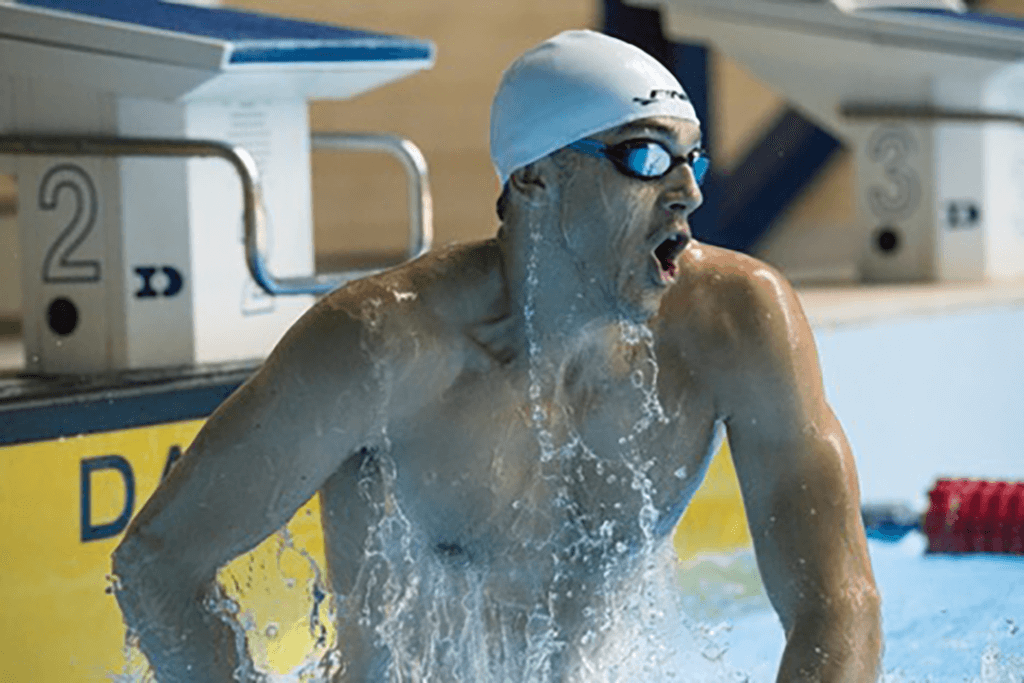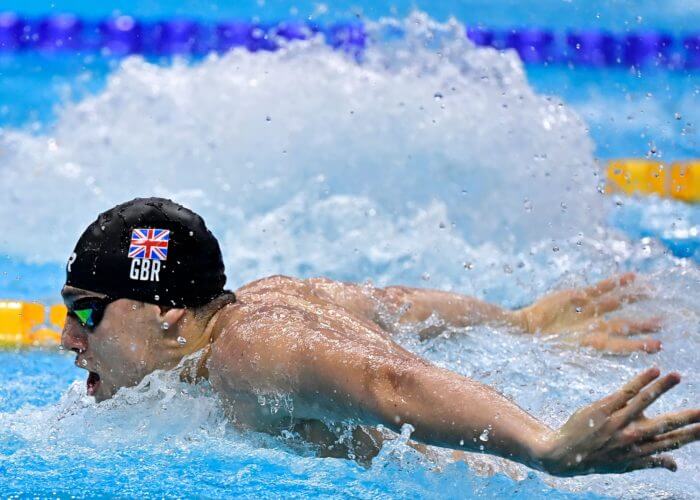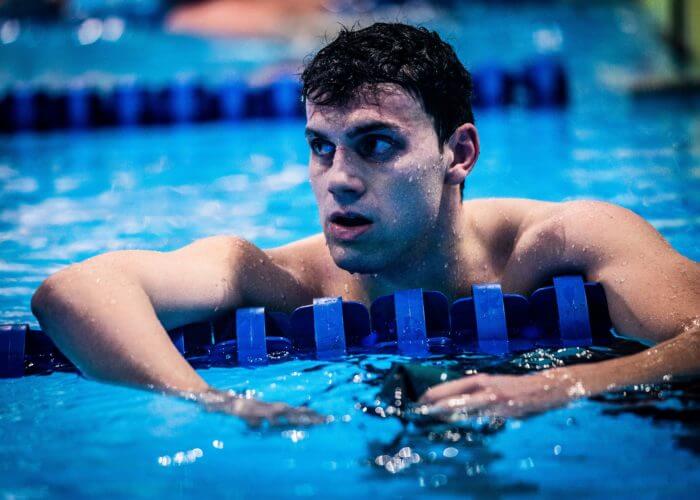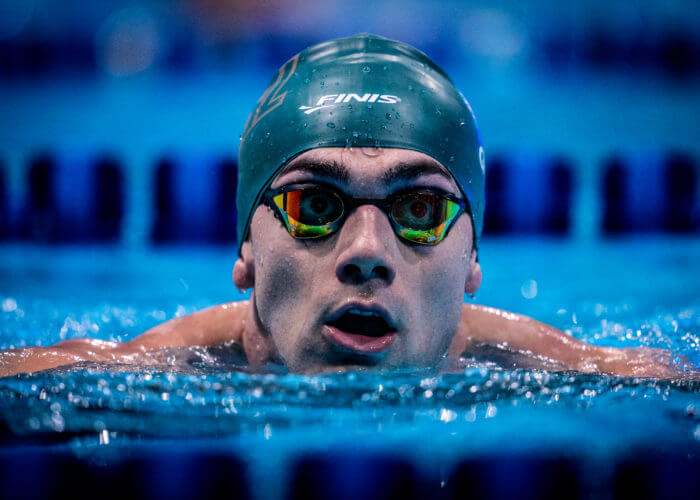As World Champs Beckon, James Guy Again Seeking to Be the Man For Great Britain

As World Champs Beckon, James Guy Again Seeking to Be the Man For Great Britain
Twenty-seven-year-old James Guy is heading to his sixth consecutive long course World Championships this year with a focus on speed, details and building confidence for a run at a third Olympics next year.
******************
In his first major international competition, James Guy was the youngest of eight finalists in the 400-meter freestyle at the 2013 World Championships. After sneaking into the final by 13-hundredths over veteran British teammate Robbie Renwick, the then-17-year-old ended up fifth at night, three seconds away from a podium finish. Five days later, Guy helped Great Britain’s 800 free relay team earn an outside lane in the final.
Guy remembers the team’s eighth-place finish at night, but also the veteran 200 freestylers he had the honor of racing on the leadoff leg. He listed American Conor Dwyer—“Who I looked up to, idolized”— as well as Japan’s Kosuke Hagino, Russia’s Danila Izotov and reigning 200 free Olympic gold medalist Yannick Agnel of France. “And there’s little James Guy.”
Of the 32 swimmers who competed in that final, only two are still competing internationally a decade later: Guy and China’s Wang Shun.
The last decade has been one of the best-ever stretches for British swimming, and while the headliner has been breaststroke star Adam Peaty, Guy has been there at every juncture. The day after Peaty won his first world title, Guy captured a title of his own, the only individual gold at a major meet he has earned.

Photo Courtesy:
At the 2015 World Championships in Kazan, Russia, Guy edged Sun Yang for the world title in the 200 free. Two days after earning silver in the 400 free, Guy held off the Chinese distance star by 6-hundredths to win gold, with world-record holder Paul Biedermann only marginally behind. Later on in the meet, Guy pulled off his fireworks once again in the 800 free relay. Entering the water for the anchor leg more than one-and-a-half seconds off the pace, he tracked down American anchor Michael Weiss to pull ahead at the finish, snapping a streak of five consecutive world titles for the Americans.
One year later at his first Olympics, Guy was unable to match that golden form, finishing sixth in the 400 free and then fourth in the 200 free, less than 3-tenths away from the podium. But he earned his first two Olympic medals with silvers in the 800 free relay and 400 medley relay. Guy pulled the 800 free relay into runnerup position with a 1:44.74 anchor split, the second-best in the field, and he even made up ground on the anchor swimmer for the gold-medal-winning Americans, the great Michael Phelps.
“Racing Phelps in Rio—that was really, really cool. I do believe that if I was next to him, I would have gotten him,” Guy said. “They were so far in front. I think they were 7:00. I feel like if I was head-to-head with him, maybe I would have gotten him. Maybe in another lifetime.”
THE BRITISH RELAY MAN
In the eight years since his unexpected individual world title, Guy has yet to win another international gold, but as Britain won a relay title at three consecutive World Championships, Guy was the only swimmer to take part in all three wins.
Guy believes he almost always excels on relays because “I just feel like there’s more added pressure because when people are relying on you to do your job, I’m always going to give 110%. I love being in that position and diving in, and you’ve got three or four guys next to you and you’re all gunning for it.
“I feel like that kind of edgy racer really comes out inside of me where they know what I’ve done for a long time and they know I’m going to attack it or I’ll just sit on you and go past you the last 50. I love that. I think you’re just born with that nature. I think you can teach it, but it’s having that born racing edge, and I’ve always had that inside of me. I’m proud to do that.”
In 2017, the British men topped the 800 free relay at the World Championships in Budapest with a victorious effort that matched the come-from-behind fireworks of two years earlier. Once again, Guy entered the water for the anchor leg significantly behind the United States, and Russia was also just ahead. But Guy blasted a 1:43.80 final split, which was the third-fastest split ever at the time, to pull his team clear of the field and win gold.
“That was probably one of the best nights that I ever had because I went 50.6 in the 100 fly (semifinals), and I was second behind Caeleb (Dressel) going into the final. And then I had the (800 free relay) a half hour later,” Guy said.

Photo Courtesy: Mine Kasapoglu / ISL
The next day, Guy ended up winning an individual bronze medal in the 100 fly, tying with then-Olympic champion Joseph Schooling while trailing only Dressel and Kristof Milak. Guy had already established himself as the butterfly swimmer on a very competitive 400 medley relay, which had taken silver behind the U.S. at the Rio Olympics and went on to earn another silver the following year at Worlds in Budapest.
Two years after that, Britain would knock off the Americans in yet another relay, the 400 medley, and once again, Guy was a central figure in that upset. Guy wrote off his performance at the World Championships that week in Gwangju, South Korea—“I wasn’t very good at that meet,” he said—and the British team ended up fifth in an extremely close 800 free relay, with Guy unable to replicate his usual anchor-leg heroics. But in the medley relay, Guy stayed close enough to Dressel to allow Duncan Scott to pull off one of the shocking anchor legs ever, rolling by American swimmer Nathan Adrian on the way to gold.
Then at the Tokyo Games, Great Britain ended a 109-year drought without Olympic relay gold with two such wins, both in dominant fashion, and Guy was the only swimmer to take part in both those wins.
“The hardest medal to win in swimming is the Olympic gold medal,” Guy said. “It’s every four years, and so much can change in that period. People come through. People disappear and come back again. Everything’s always changing. That’s the one I always wanted to win as a kid.”
Before Guy geared up for relay action, two other British men reached the top of the podium. After Peaty repeated as titlist in the 100 breast, Guy’s training partner Tom Dean won gold in the 200 free ahead of Scott for the country’s first 1-2 finish in swimming since the 1908 Olympics in London. “We’re always head-to-head all the time,” Guy said of Dean. “We play golf together. Going to Tokyo, everyone was training so well. When he won, it’s kind of like I was part of that as well because obviously I’d seen what he’d done before that.”
And then in the 800 free relay, Britain won in a rout. Dean, Guy, Matt Richards and Scott combined for a mark of 6:58.58, three seconds clear of the field and a mere 3-hundredths off the world record.
“My mate kept telling me, ‘It’s T-minus four hours until you win Olympic gold,’” Guy said. “I was like, ‘Mate, stop texting me because it’s not going to happen.’ We were walking down there to the final. We were just talking and laughing and chatting. We knew we were going to swim well because the work was already done. ‘Do your process, do your race and just enjoy being out there.’
“I feel like when you enjoy it more, good things happen. Obviously, we won. We missed the world record, unfortunately, but you saw the emotion come out. You saw me crying. I was all over the place. That’s how much it meant to me because that’s the one I always wanted to get.”
Guy was scheduled to race the individual 100 fly in Tokyo, but at the last minute, he opted to scratch to focus on his roles on Britain’s medley relays, the inaugural Olympic final of the mixed-gender relay and the men’s relay. Making that decision, he said, is one of the proudest moments of his swimming career.
“That one definitely hurt me because I knew with the way I was swimming in the meet, I was definitely in a chance of getting the bronze medal,” Guy said. “But I always believe everything happens for a reason. I look back at that and think, ‘That wasn’t meant to be.’”
But when Guy pulled Britain into the lead with the quickest butterfly split in the field (50.00), he had no regrets. The combination of Kathleen Dawson, Peaty, Guy and Anna Hopkin won gold by more than a second in world-record time. On the final day of the meet, Britain ended up with silver in the 400 medley relay, with the Americans needing a world record to overcome their rivals.
SEEKING A THIRD OLYMPICS
Now 27, Guy will be swimming in his sixth long course World Championships. But his main focus is next year in Paris, where he hopes to compete in his third Olympics.

Photo Courtesy: Mine Kasapoglu / ISL
Great Britain did not hit its usual relay success at last year’s World Championships with both Peaty and Scott absent, but the full 800 free relay team from the Olympics will return this year after strong performances at Britain’s Trials in April. Guy’s time of 1:45.85 was his fastest from a flat start since 2017.
In practice, Guy believes he is carrying more speed and power than ever before at the current juncture of the season, and on long freestyle sets, he has focused on efficiency by taking no more than nine strokes per length (short course meters).
“Rather than just swimming it and doing whatever you need to do, have a purpose behind everything you’re doing,” Guy said. “Hold more water, and when you go fast and pick it up, you’re going to fly. That’s one thing that Duncan taught me a long time ago, being really efficient all the time because when you pick it up and go faster, you’re holding more water.”
Guy credits his long-running partnership with FINIS, his sponsor since 2017, as critical to his success. He has been pleased with the new HydroX racing suit, and he has enjoyed using the company’s Smart Goggle, which shows times and data to its users while they swim, to help him keep track of his progress during aerobic sets.
“When I first joined FINIS in 2017, from what we started with to what we have now, the time and the effort that’s gone into it, it’s worlds apart,” Guy said. “I feel really confident in what I’m wearing, and for me, what John (Mix) and his team have done in the business, they’re on the ball. They want to get better. They’re investing a lot of money into these suits and into the Smart Goggle, too. That’s really, really important.”
* * *
Guy knows that this summer’s World Championships in Fukuoka, Japan, will be an important setup for the Olympic year, but his primary motivation for continuing the sport is continued success at the Olympics: “I’ve won everything that I want to win, but I want to win more,” Guy said. His stated goals include repeating as 800 free relay gold medalist with his British teammates and swimming a personal-best time in the 100 fly. So when it comes to the final stretch before the Paris Games, everything changes.
“In the Olympic year, everyone steps up, especially where we train at Bath. We go to a different level in terms of adding more race pace each week, just being on it a little bit more,” Guy said. “You can’t carry that momentum every year each year because it’s not sustainable. That’s where mental health can come in. You have to be able to learn when to take off the gas.
“Even with FINIS, they’ve been so supportive of me around this. When I’ve not had the best years in my swimming career, they’ve always backed me, but in the Olympic year, in 2021, I was completely on the ball. I knew that I had to step up and get ready for the Olympics, and they understood that for me. That’s what it’s about now.”
Download the June Quarterly of Swimming World Magazine



